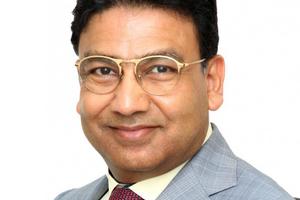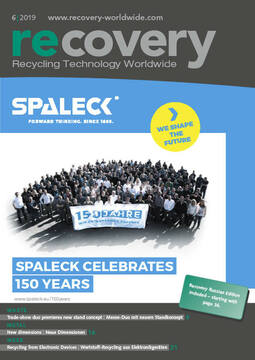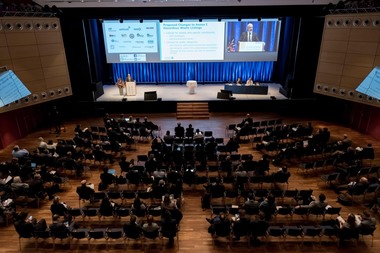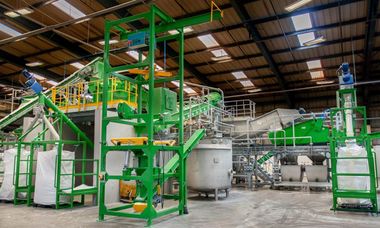IERC 2020: Get the Program!
Highlights of IERC 2020 include:
Impacts of E-mobility on the recycling industry
Do electric cars and bikes end up as electronic scrap?
What are the opportunities of the Circular Economy for your businesses?
Worldwide take-back schemes, quotas and challenges faced by OEMs
Business opportunities and models in emerging markets
Best available recycling technologies
Safety standards for transportation and storage
Environmental management of hazardous components such as lithium batteries
Standards, compliance and regulations in the electronics sector
Are free riders still an issue?
Impacts of data security on reuse & refurbishment
Trading of used electric and electronic parts – good or bad?
Plastics recycling: “The long way from hell to success!”
Round Tables: “Shifting Markets China Ban 2 Years On” and „Collection Targets! – Achievability & Accountability”
Country reports
The program includes 3 powerful keynote speakers, tech talks and 2 round tables
(details here: //www.icm.ch/ierc-2020" target="_blank" >www.icm.ch/ierc-2020:www.icm.ch/ierc-2020).
Attendees also have exclusive access to the following plant tours and workshops:
Plant Tours:
Montanwerke Brixlegg AG, Brixlegg (Visit to the refinery and foundry)
Müller-Guttenbrunn-Group (Visit to the shredder plant of MGG Metrec, the post-shredder treatment plant of MGG Metran and the plastic recycling plant of MGG Polymers)
Workshops:
How to Optimize Plastics Recycling to Obtain High Quality Polymers for Circular Electronics?
Requirements of the R2v3 Standard
Batteries – Power Density vs. Safety
Major exhibition & perfect networking platform
IERC 2020 is the electronics recycling industry’s leading event, bringing together more than 500 recycling professionals from around the globe.
A large exhibition area with over 80 booths provides the perfect opportunity to reach key industry decision makers and to find out what’s new in the global electronics recycling business.
Interview with Surendra Borad Patawari, Gemini Corporation N.V./Belgium
One of this year‘s keynote speakers will be Surendra Borad Patawari. The internationally renowned plastics recycling expert and businessman is the Chairman of Gemini Corporation NV in Belgium. At the IERC 2020, Mr Patawari will provide us with an overview of developments worldwide on the plastics recycling market. The ICM organizers managed to get to speak to him in advance:
ICM: Mr Patawari, plastics have been criticised worldwide for the marine pollution and littering they cause. There are now many initiatives to stop using plastics. How worried are you that one day you will run out of material?
Mr Patawari: Plastics are so much in use and in demand that we human beings cannot live without them for even one hour. We wake up in the morning and the first thing we do is to look for our mobile phones, which are made of plastic. We drive to the office in a car made of plastic and we start working in our offices with desktop computers and laptops that are also made of plastic. In fact, plastics impact the life of every person every day and everywhere. Without plastics, food waste would increase. Without plastics, fuel costs would increase due to the heavier vehicles. Without plastics, medical care would be very difficult if not impossible. In fact, we generate so much plastic that every hour, waste equal to 2000 trucks is created. We generate about 300 million tonnes of plastics waste every year and sadly less than 20 % of that amount is recycled.
ICM: In many cases, plastics manufacturers are beginning to pay more attention to recyclability. Is this a general trend?
Mr Patawari: The plastic manufacturers will have no choice but to pay attention to recyclability. Otherwise they will have to pay the end-of-life costs. At the moment, it is not a general trend, but it will soon become one. The plastics industry will be forced to do so under pressure and through the persuasion of the public, the press and eventually the politicians. The problem is much bigger than we are being led to believe. Primary plastic production is increasing by more than 3 % per annum, but recycling is increasing by less than 2 %. At this rate there will be over 12 billion tonnes of plastic waste by the year 2050.
ICM: In which fields of application do you see the best chances of success for recycled plastics?
Mr Patawari: I see the increasing use of recycled plastics in packaging materials and products with short duration. However, the quality of recycled plastics (PCR) still needs to improve substantially. Although many brand owners have made commitments to use recycled plastics ranging from 20 % or more in the next five years, there are not enough recycled materials available to fulfil these commitments. We will need over 6 million tonnes of good-quality PCR and currently the availability of this quantity looks difficult.
ICM: Should plastics that cannot be recycled simply be banned?
Mr Patawari: If there is a legal ban, people will find ways to bypass it or circumvent it. Instead, there must be an END-OF-LIFE TAX on materials that cannot be recycled. Market forces will encourage a reduction in the use of such plastics. Funds from this tax can be used to find solutions for these materials.
ICM: A disposal solution for non-recyclable plastics may soon be in sight. Numerous chemical companies are involved in the chemical recycling of plastics. What chances of success do you see for this process?
Mr Patawari: Mechanical recycling alone will not solve the challenge of plastics recycling. It needs to be complemented with chemical recycling. However, most of the chemical recycling still consists of pilot projects. They still need to begin commercial level production. I learnt from the well-known plastics consultancy company IHS and from the Zero Waste Association that chemical recycling is still five to ten years away. However, there is a tremendous push to make a breakthrough and find a solution.





